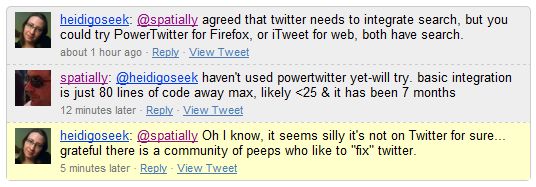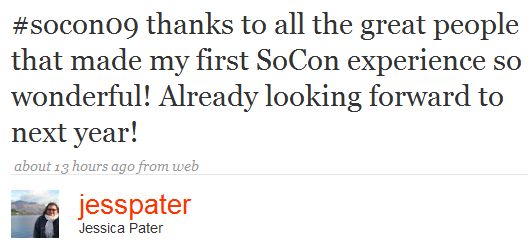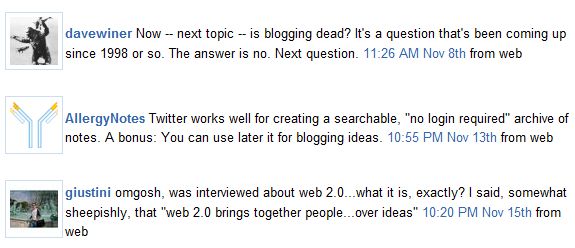Are you new around here? Spatially Relevant is about sharing/identifying trends in marketing, branding and how product managers can change a business with technology, such as social media. Stick around and add the rss feed to your reader or follow on twitter. Now on to the article.
—
Twitter continues to be an interesting study in business dynamics. A zero revenue company which acquires Summize, generates a valuation of $250 million and provides a development friendly ecosystem which is flourishing, maybe the goal is for others to deliver features. The most recent/rumored $35M cash infusion would make one think this would provide for some additional capacity and wherewithal to invest into feature extensions and integration of existing assets. This is where Twitter should learn a lesson from Google – integrate capabilities as quickly as possible.
Google knows the importance of integration, Google ads were nearly immediately on Feedburner and now the big account collapse is underway for all of us. I have so many things which have been merged that I secretly look forward to the event post a Google acquisition.
Postini is another great integration story for Google. Good product managers collaborate, conspire and collapse apps as quickly as possible, this however isn’t the case at Twitter. I think Team Twitter has only done one acquisition and had all the performance issues in the interim, so maybe they should get some slack. After all, Twitter is new at this whole Product manager thing. The management team may just be at the, “so I guess as long as it works, who really cares if you can access it easily” stage with a quick transition into “how to monetize” phase of product management.
“Yup this thing might just be good enough someone might pay for something.”
Twitter Gives Us the Bird
For a company who should have updated their home page with new quotes by now, they definitely have hit a home run with the brand bird which appears to be the key asset, but they could use just a little more “management” of the product. Maybe a messaging refresh, website update, feature delivery is needed at this point.
Good news – it won’t be hard to add new features or find ones to build out. From a competitive intelligence perspective , the Product Managers could quickly see what others are building and prioritize, they could look at what they already have and find ways to improve it. This may be asking a bunch from folks who have like 2 year old quotes on their home page.
What quotes?
I know most users never see the quotes anymore, since they are hidden below the fold and normally as users we are logged in. So here are the ill placed stale quotes which might need a refresh from the product marketing manager, if they have one:
BTW, cool quotes hidden below the fold is like not having cool quotes you may want to just whack them and get 1K back for processing/data transfer. So with that baseline, I’m curious beyond the great brand Bird, what are these folks working on?
Probably still working on scale. At the end of the day they probably have spent the last 28 sprints developing infrastructure and scale improvements, but time for some features folks. IDEA! Forget new features, just provide access to the ones you have, like say — search.
Today, you can easily search Twitter @ search.twitter.com, but you click on the Twitter logo, you don’t go to Twitter – you go to back to search/summize. Want to search from twitter? Type in the URL and GO! Not that useful.
So if the development community realizes search in a baseline feature, why can’t Twitter? I think their PM’s are writing excruciating requirements with “if/then/else statements” based on user load, high availability and core readiness, there is probably a backlog somewhere chuck full o’ opportunity. Not knowing the development methodology I’ve expressed some requirements for consideration – let’s call it the voice of the customer if you will.
The Requirements:
Old School Version:
Mandatory
- The system shall provide an authenticated user a way to easily leverage the existing search capabilities @ search.twitter.com while maintaining session state.
- The system shall provide access to search for unauthenticated users.
- The system shall provide a way to navigate back to the core Twitter UI without keystrokes.
- The system shall provide keystroke based navigation options for the mouse impaired.
Persona Based:
- Steve, a mid-level software developer who really likes Phish, would like to be able to easily find Tweets of interest, via let’s say hash tags or keywords and not have to type in a URL and easily return to HIS stream with just a click.









